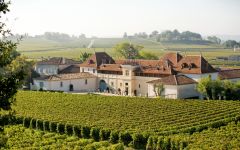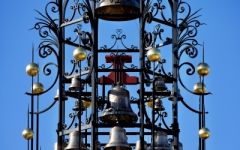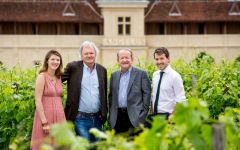Chateau Angelus 1989
-
Robert
Parker


Product Details
Your Rating
Somm Note
Winemaker Notes
Professional Ratings
-
Robert Parker's Wine Advocate
A great Angelus and one of the two or three best vintages made under the talented young Hubert de Bouard, this wine still has a youthful, saturated ruby/purple color and a sweet nose of melted licorice intermixed with creme de cassis, tapenade, cedar, spice box, and vanilla. Very full-bodied, opulent, and rich, it is one of the 1989s that justifies the lofty reputation of this vintage. Extremely full-bodied, this wine can be drunk now or cellared for at least another 10-15 years.
Other Vintages
2022-
James
Suckling -
Jeb
Dunnuck -
Robert
Parker - Decanter
- Decanter
-
Robert
Parker -
Jeb
Dunnuck
-
Wine
Enthusiast -
James
Suckling -
Jeb
Dunnuck - Decanter
-
Robert
Parker
-
James
Suckling -
Jeb
Dunnuck - Decanter
-
Robert
Parker
-
Robert
Parker -
Jeb
Dunnuck -
James
Suckling -
Wine
Spectator - Decanter
-
Wine
Enthusiast
-
Jeb
Dunnuck -
James
Suckling - Decanter
-
Wine
Enthusiast -
Wine
Spectator -
Robert
Parker
-
Wine
Enthusiast -
James
Suckling -
Robert
Parker - Decanter
-
Jeb
Dunnuck -
Wine
Spectator
-
James
Suckling -
Robert
Parker -
Jeb
Dunnuck -
Wine
Enthusiast -
Wine
Spectator - Decanter
-
Wine
Enthusiast -
James
Suckling - Decanter
-
Wine
Spectator -
Robert
Parker
-
Wine
Enthusiast -
Robert
Parker -
Wine
Spectator -
James
Suckling
-
James
Suckling -
Robert
Parker -
Jeb
Dunnuck -
Wine
Enthusiast -
Wine
Spectator
-
James
Suckling -
Robert
Parker -
Wine
Spectator -
Wine
Enthusiast
-
Robert
Parker -
Wine
Spectator -
James
Suckling -
Wine
Enthusiast
-
Wine
Enthusiast -
Robert
Parker -
Connoisseurs'
Guide -
Wine
Spectator
-
Robert
Parker -
Wine
Spectator -
Wine &
Spirits -
Connoisseurs'
Guide
-
Jeb
Dunnuck -
Robert
Parker -
Wine &
Spirits -
Wine
Spectator -
Connoisseurs'
Guide
-
Wine &
Spirits -
Robert
Parker -
Wine
Spectator
-
Robert
Parker
- Decanter
-
Robert
Parker
-
Robert
Parker -
Wine
Spectator
-
Robert
Parker
-
Robert
Parker -
Wine &
Spirits -
Wine
Spectator
-
Robert
Parker
-
Wine
Spectator -
Robert
Parker
-
Robert
Parker -
Wine
Spectator
-
Wine
Spectator
-
Robert
Parker









The vineyard of Chateau Angélus is situated in a natural amphitheatre overlooked by the three Saint-Emilion churches. In the middle of this special site, the sounds were amplified and the angelus bells could be heard ringing in the morning, at midday and in the evening. They cadenced the working day in the vineyards and villages, calling the men and women to stop their labours for a few minutes and pray.
Less than a kilometre from the famous Saint-Emilion bell tower, situated on the much-vaunted south-facing “foot of the hill”, Angélus has been the life work of eight generations of the Boüard de Laforest family.
In the first-ever classification of Saint-Emilion wines in 1954, Chateau Angélus was a Grand Cru Classé. Already at the time, it benefitted from a solid reputation, which helped it survive the Bordeaux wine crisis of 1973 and take part in the oenological renewal of the 1980’s. This was the context in which Hubert de Boüard de Laforest, a graduate oenologist from Bordeaux University, took advantage of this marvellous wine’s illustrious past, while being resolutely turned towards the future and launched and continued to implement an ambitious, innovative policy in favour of achieving excellence in wine growing and making.

One of the world’s most classic and popular styles of red wine, Bordeaux-inspired blends have spread from their homeland in France to nearly every corner of the New World. Typically based on either Cabernet Sauvignon or Merlot and supported by Cabernet Franc, Malbec and Petit Verdot, the best of these are densely hued, fragrant, full of fruit and boast a structure that begs for cellar time. Somm Secret—Blends from Bordeaux are generally earthier compared to those from the New World, which tend to be fruit-dominant.

Marked by its historic fortified village—perhaps the prettiest in all of Bordeaux, the St-Émilion appellation, along with its neighboring village of Pomerol, are leaders in quality on the Right Bank of Bordeaux. These Merlot-dominant red wines (complemented by various amounts of Cabernet Franc and/or Cabernet Sauvignon) remain some of the most admired and collected wines of the world.
St-Émilion has the longest history in wine production in Bordeaux—longer than the Left Bank—dating back to an 8th century monk named Saint Émilion who became a hermit in one of the many limestone caves scattered throughout the area.
Today St-Émilion is made up of hundreds of independent farmers dedicated to the same thing: growing Merlot and Cabernet Franc (and tiny amounts of Cabernet Sauvignon). While always roughly the same blend, the wines of St-Émilion vary considerably depending on the soil upon which they are grown—and the soils do vary considerably throughout the region.
The chateaux with the highest classification (Premier Grand Cru Classés) are on gravel-rich soils or steep, clay-limestone hillsides. There are only four given the highest rank, called Premier Grand Cru Classés A (Chateau Cheval Blanc, Ausone, Angélus, Pavie) and 14 are Premier Grand Cru Classés B. Much of the rest of the vineyards in the appellation are on flatter land where the soils are a mix of gravel, sand and alluvial matter.
Great wines from St-Émilion will be deep in color, and might have characteristics of blackberry liqueur, black raspberry, licorice, chocolate, grilled meat, earth or truffles. They will be bold, layered and lush.
